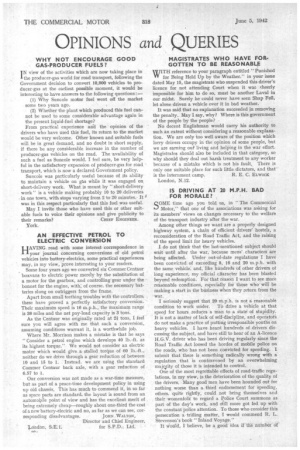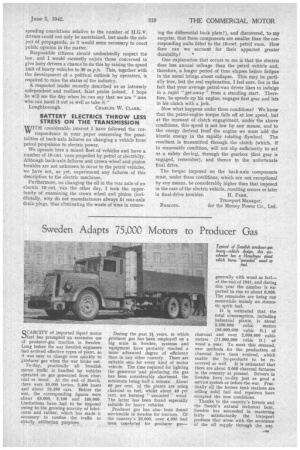OPINIONS and QUERIES
Page 24

Page 25

If you've noticed an error in this article please click here to report it so we can fix it.
WHY NOT ENCOURAGE GOOD GAS-PRODUCER FUELS?
IN view of the activities which are now taking place in
the producer-gas world for road transport, following the Government decision to convert 10,000 vehicles to producer-gas at the earliest possible moment, it would be interesting to have answers to the following questions :— (1) Why Suncole motor fuel went off the market some two years ago.
(2) Whether the plant which produced this fuel cannot be used to some considerable advantage again in the present liquid-fuel shortage?
From practical experience add the opinion of the drivers who have used this fuel, its return to the market would be very welcome. Other known and suitable fuels will be in great demand, and no doubt in short supply, if there be any considerable increase in the number of producer-gas vehicles on the road. The -availability of such a fuel as Suncole would, I feel sure, be very helpful in the satisfactory expansion of producer-gas for road transport, which is now a declared Government policy.
Suncole was particularly useful because of its ability to maintain a vehicle on gas while it was engaged on short-delivery work. What is meant by "short-delivery work" is a vehicle making probably 10 to 20 deliveries in one town, with stops varying from 2 to 20 minutes. It g was in this respect particularly that this fuel was useful.
May I invite those who have used this or other suitable fuels to voice their opinions and give publicity to their remarks? CHIEF ENGINEER. York.
AN EFFECTIVE PETROL TO ELECTRIC CONVERSION
HAVING read with some interest correspondence in your journal concerning conversions of old petrol vehicles into battery-electrics, some practical experiences may, in my view, prove interesting to your readers.
Some four years ago we converted six Commer Centaur boxvans to electric power merely by the substitution of a motor for the gearbox, and controlling gear under the bonnet for the engine, with; of course, the necessary batteries slung on outriggers from the frame.
Apart from small teething troubles with the controllers, these have proved a perfectly satisfactory conversion. Their maximum speed is 16 m.p.h., the maximum range is 36 miles and the net pay-load capacity is 3 tons.
As the Centaur was originally rated at 2 tons, I feel sure you will agree with me that such a conversion, assuming conditions warrant it, is a worthwhile job.
Where Mr. Morrison makes a mistake is that he says " Consider a petrol engine which develops 40 lb.-ft, as its highest torque." We would not consider an electric motor which would give a stalled torque of 60 lb.-ft., neither do we drive through a gear reduction of between 10 and 15 to 1. Instead, we are using the standard Commer Centaur back axle, with a gear reduction of 6.57 to -1.
Our conversion was not made as a war-time measure, but as part of a peace-time development policy in using up old chassis. This has much to commend it, in so far as spare parts are standard, the layout is sound from an automobile point of view and has the excellent merit of being extremely cheap—roughly about one-third the cost of a new battery-electric and no, as far as we can see, cor responding disadvantages. Joxis WALTON, Director and Chief Engineer, for S.P.D., Ltd. MAGISTRATES WHO HAVE FOR GOTTEN TO BE REASONABLE
WITH reference to your paragraph entitled "Punished for Being Held Up by the Weather." in your issue dated May 15, the magistrate who suspended this driver's: licence for not attending Court when it was sheerly impossible for him to do so, must be another Laval in our midst. Surely he could never have seen Shap Fell, let alone driven a vehicle over it in bad weather.
It was said that no explanation succeeded in removing the penalty. May I say, why? Where is this government of the people by the people?
No decent Englishman would carry his authority to such an extent without considering a reasonable explanation. We are only too well aware of the position which lorry drivers occupy in the opinion of some people, but we are earning out living and helping in the war effort. Magistrates should also be included in that category, so why should they deal out harsh treatment to any worker because of a mistake which is not his fault, There is only one suitable place for such little dictators, and that is the internment camp. R. E. C. ELwrox London, N.12.
IS DRIVING AT 20 M.P.H. BAD FOR MORALE?
SOME time ago you told us, in "The Commercial Motor," that one of the associations was asking for its members' views on changes necessary to the welfare of the transport industry after thewar.
Among other things we want are a properly designed highway system, a chain of efficient drivers' hostels, a reconsideration of the Road Traffic Act, and the raising of the speed limit for heavy vehicles.
I do not think that the last-mentioned subject should wait until after the war, because naerts' characters are being affected. Under :out-of-date regulations I have been convicted of exceeding 8, 16 and 20 m.p.h. with the same vehicle; and, like hundreds of other drivers of long experience, my official character has been blasted beyond redemption. For that reascin I want to see more reasonable conditions, especially for those who will be making a start in the business when they return from the war.
I seriously suggest that 20 M.p.h. is not a reasonable condition to work under. To drive a vehicle at that speed for hours reduces a man to a state of stupidity. It is not a matter of lack of self-discipline, and operators do not make a practice of putting irresponsible youths on heavy vehicles. I have heard hundreds of drivers discussing the subject, and have still to hear of an A-licence H.G.V. driver who has been driving regularly since the Road Traffic Act loosed the hordes of mobile police on the roads, who has not been convicted for speeding. I submit that there is something radically wrong with a regulation that is contravened by an overwhelming majojity of those it is intended to control.
One of the most regrettable effects of road-traffic regulations, in my view, is the deterioration of the quality of the drivers. Many good men have been hounded out for nothing worse than a third endorsement for speeding, others, quite rightly, could not bring themselves arid their womenfolk to regard a Police Court summons as part of the day's work, and still more got fed up with the constant police attention. To those who consider this persecution a trifling matter, -I would commend R. L. Stevenson's book "Inland Voyage."
It viotild, I believe, be a good idea if the nuinber of speeding convictions relative to the number of H.G.V. drivers could not only be ascertained, but made the subject of propaganda, as it would seem necessary to court public opinion in the matter.
Responsible citizens should undoubtedly respect the law, and I would earnestly enjoin those concerned to give lorry drivers a chance to do this by raising the speed amit of heavy vehicles to 30 m.p.h. This, together with the development of a political outlook by operators, is required to raise the status of the industry.
A respected leader recently described us as intensely independent and resilient, faint praise indeed. I hope he will see the day when he can say that we are "men who can hand it out as well as take it."
Loughborough. CHARLES W. CLARK.
BATTERY ELECTRICS THROW LESS STRESS ON THE TRANSMISSION WITH considerable interest I have followed the correspondence in your paper concerning the possibilities of back-axle failures on changing a vehicle from petrol propulsion to electric power.
We operate here a mixed fleet of vehicles and have a number of 10-cwt. vans propelled by petrol or electricity. Although back-axle failures and crown-wheel and pinion troubles are not unknown to occur to the petrol vehicles, we have not, as yet, experienced any failures of this description to the electric machines.
Furthermore, on changing the oil in the rear axle of an electric 10 cwt. van the other day, I took the opportunity of examining the crown wheel and pinion (incidentally, why do not manufacturers always fit rear-axle drain plugs, thus eliminating the waste of time in remov
ing the differential back plate?), and discovered, to my surprise, that these components are smaller than the corresponding units fitted to the 10-cwt. petrol vans. How then can we account for their apparent greater durability? • One explanation that occurs to me is that the electric does less annual mileage than the petrol vehicle and, therefore, a longer period of time elapses before fatigue in the metal brings about collapse. This may be partially true, but the real explanation, I feel sure, lies in the fact that your average petrol-van driver likes to indulge in a rapid " get-away " from a standing start. Therefore, he speeds up his engine, engages first gear and lets in his clutch with a jerk.
Now what happens under these conditions? We know that the petrol-engine torque falls off at low speed, but at the moment of clutch engagement, under the above conditions, this speed is not low by any means, and to the energy derived front the engine we must add the kinetic energy in the rapidly rotating flywheel. The resultant is transmitted through the clutch (which, if in reasonable condition, will not slip sufficiently to act as a safety device), through the gearbox (first gear is engaged, remember), and thence to the unfortunate final drive.
The torque imposed on the back-axle components must, under these conditions, which are not exceptional by any means, be considerably higher than that imposed in the case of the electric vehicle, resulting sooner or later in final-drive troubles. H. PARK,
Runcorn. for the Mersey Power Co., Ltd.
Transport Manager,




















































